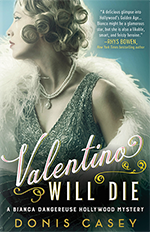Every once in a while I Google myself to see if any new reviews have come up. A couple of weeks ago I found a new review of Buzzard that appeared in the Norman Transcript. This is the Norman, Oklahoma, daily newspaper, so I was glad to see that they had reviewed the book. We lived in Norman for several years in our youth, on two seperate occasions, in fact. In the early seventies we both went to graduate school at the University of Oklahoma there. In fact, that’s where we met. Then later, in the late seventies, early eighties, we moved back to Norman and both worked for the University libarary system. So I feel rather like Norman is “back home”.
I’m afraid I don’t know the name of the person who reviewed the book for the paper. The byline is just “staff writer”. I cannot tell if the writer is a man or a woman, so I’ll just vary my pronouns when I refer to her. The review is very good – he says that “It’s obvious Donis Casey has a deep love for Oklahoma” and “a gift for plotting, is a natural born story teller and knows the Sooner state history well.” The reviewer goes on to say many very nice things about the book, all of which I appreciate very much — in fact, I’ll post most of it on the “Reviews” page of this site.
However, she didn’t like the dialog — or more precisely, the dialect — at all. To wit : “…Alafair Tucker is a unique character with depth and intelligence. She’s strong, makes a mean peach pie and can gossip with the best of ’em — but she doesn’t sound like it. In between wonderful insights and a nice background tale of early Oklahoma life, Casey forces her heroine to spout cliches like “I’ll swan”, “warm your innards”, and “Oh, my girl, God smite me for letting you get mixed up in this ugly thing.”
I am fascinated by my reviews. They teach me a lot, often stroke my ego, sometimes make me want to stop writing and take up ditch digging. But they always tell me quite a bit about the reviewer. I have a distinct feeling that this person is young, and that he is an intellectual. I’m very very aware of my dialect when I write, and often worried about it, too. I do in fact use terms and phrases that are now cliche. And the reason is that this is the way my grandparents talked, all of whom were teens and twenties in the 1910’s. In truth, I don’t write exactly like they talked, because it would not be understandable if I did.
I’m fairly well educated myself, and I grew up determined to speak English in as standard a fashion as I could. My parents were college educated, but their parents and older relatives weren’t, so I grew up around country people. My most schooled grandparent graduated from the eighth grade, which was as far as most people in that time and place could go. One grandparent only got as far as the third grade. But just because you didn’t get very far in school doesn’t mean you aren’t smart. Michael Caine, who is Cockney, once said that people too often judge your intelligence by your accent.
I fear I did that too often during my youth. Now that I’m not so young, I realize that my grandma knew a heck of a lot more about people and about living than I do, lack of advanced degrees notwithstanding.
Writing dialect is dangerous business, any as any writer knows. It’s really hard not to sound rediculous, and so most teachers warn students away from it. Now that most people no longer use such a strong dialect, I find that I miss it. To me it sounds like my warm and loving childhood, and that’s why I try to give a flavor of it in my writing. Whether I’ve succeeded or not is debatable, but I’m sure I will continue to try.
In other news, I am looking at this entry on my brand new monitor, which is so big and bright that I don’t need my glasses to see it. Also, I have updated my “Events” page for the first part of 2007. You’ll notice, Dear Reader, that many of the entries lack some detail, since several of the events are yet to be finalized. Keep looking, because I’ll fill in the details as they become available. Next Sunday, Feb. 25, I’ll be at Singing Winds Bookstore in Benson Arizona, which is a fascinating store located on a cattle ranch. I’ll update you all on that adventure after the fact.



February 24th, 2007
Donis,
My family is from eastern Oklahoma and they talk just like your characters in the book. “I’ll swan” is still used.
I personally love both of your books. Don’t let some young city fella tell you about dialect. :0)
Keep up the great work. Can’t wait to read your next one.
Sincerely,
Pam Morgan
March 15th, 2007
Donis, my husband is from Oklahoma and we lived there for a couple of years when we were first married (in fact, he was at OU Law when you were in grad school). I love your books, and one of the things I enjoy most is the dialect and the expressions your characters use. Many of the “old folks” (and some of the not so old folks) we knew when we were first married used those expressions, and being reminded of them takes me back thirty-some years. Thank you for Alafair and for bringing her world to life – and – even though Hornswaggled is just out – please please give us another soon!
With thanks,
Liz Rudolph